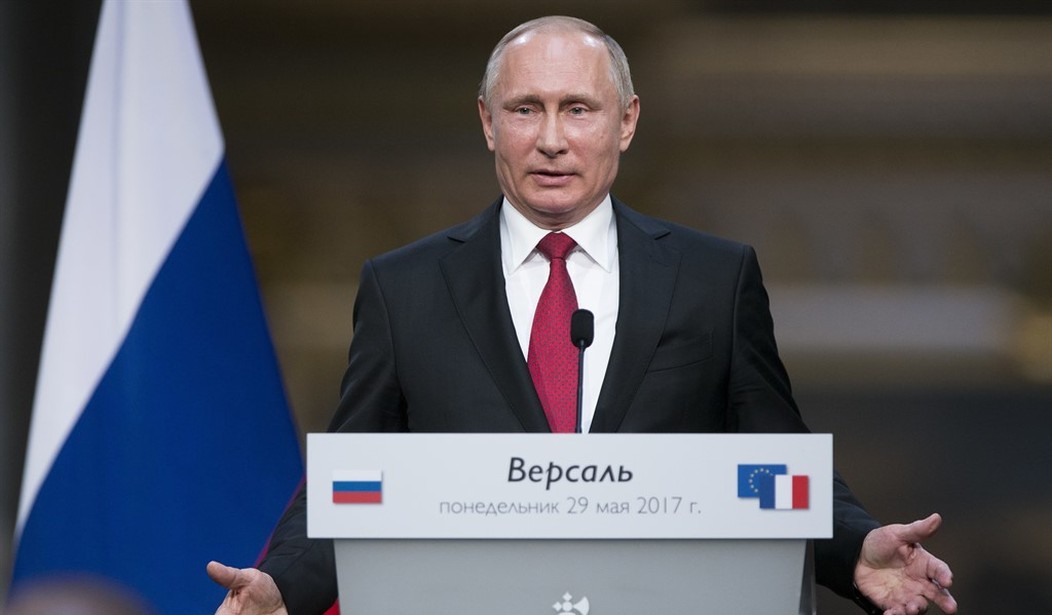Trump being Trump, this may be as much a slap at his domestic critics on Russia as it is a pot sweetener for Moscow on international cooperation. What better way to show the opposition here at home that he won’t let the Russiagate investigation influence his foreign policy than by undoing a punishment imposed by Obama on Russia for its campaign hacking? The optics are so terrible that you’re left to conclude that that’s the point. It’s a middle finger to the people running around screaming “collusion!”
But I think there’s more here than meets the eye. The key question: Is this part of a quid pro quo or is it a gift to Russia, to bring them to the table? What does America get from this gesture by our “America First” president?
Early last month, the Trump administration told the Russians it would consider turning the properties back over to them if Moscow would lift its freeze, imposed in 2014 in retaliation for U.S. sanctions related to Ukraine, on construction of a new U.S. consulate on a certain parcel of land in St. Petersburg.
Two days later, the U.S. position changed. Secretary of State Rex Tillerson told Russian Foreign Minister Sergei Lavrov and Russian Ambassador Sergey Kislyak at a meeting in Washington, that the United States had dropped any linkage between the compounds and the consulate, according to several people with knowledge of the exchanges.
The meeting between Tillerson and Lavrov came a few hours before the fateful visit to the White House at which Trump allegedly spilled the beans about ISIS intelligence. (Big day for Russia!) So, it seems the U.S. offered Russia a trade — they get their compounds here back and we get to build a new consulate over there free of Russian surveillance equipment. And Russia counteroffered: We get our compounds back and maybe then we’ll think about giving you something in return. Russia, claims WaPo, insisted “that the compound issue was a hostile act that deserved no reciprocal action to resolve, and had to be dealt with before other diplomatic problems could be addressed.” And now it looks like the State Department is moving towards accommodating them. That’s the art of the deal, my friends.
Read the whole article, though. There’s an odd digression in the middle about a vacancy at the UN for the position of undersecretary general for counterterrorism. Russia will likely get the appointment since it’s the only one of the five permanent members of the Security Council not to hold an undersecretary position right now. Its likely choice to fill the vacancy is — ta da — our old friend Sergei Kislyak, the current Russian ambassador to the U.S. and the man who sunk Mike Flynn’s career and might end up sinking Jared Kushner’s. What do the compounds in New York and Maryland have to do with a UN position for Kislyak? Good question. Noah Rothman’s been wondering too:
https://twitter.com/NoahCRothman/status/870073109184991232
https://twitter.com/NoahCRothman/status/870073605417312257
Is the idea that if the U.S. supports Kislyak’s UN appointment, which would expose Trump to more heat from Russiagate critics, then we’ll get our new consulate in St. Petersburg? If so, why do we need to give Russia back the compounds in New York and Maryland too? Or, as Rothman suggests, is all of this being leaked by people inside the administration who are angry that Trump is thinking of reinstating the compounds and hoping that exposing the proposal will lead to a public outcry that forces him to back down? Obviously there’s some sort of trade in the offing. It’s just that Russia apparently wants the U.S. to admit “wrongdoing” first by unilaterally reinstating the compounds. And since that was an Obama policy — never mind whether it was justified on the merits, to punish Russia for its campaign hacking — Trump may feel fine about doing it, whatever it says about the relative strength and weakness of the two countries.
One last note. Apparently the compounds may be reinstated but with strings attached, i.e. without diplomatic immunity so that U.S. law enforcement could enter the premises if need be. That would make them sub-optimal for espionage. But then, the fact that the compounds were operating in plain sight for decades, known to American intelligence, means that they can’t have been very valuable in the first place. It’s odd that Russia is so insistent about getting them back under the circumstances. It may be the symbolism, of Trump undoing Obama’s legacy, that means more to them than the compounds themselves.








Join the conversation as a VIP Member